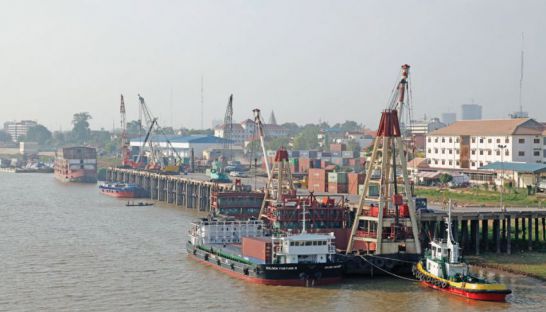Cambodia: Rice millers balk at export fees
Numerous members of the Cambodia Rice Federation (CRF), the body tasked with lobbying on the sectors behalf, have stopped paying membership dues and export fees, claiming that they cannot afford to as the industry continues to struggle with high production costs and regional export competition.
According to the terms of CRF membership, each miller is required to pay $200 annually and an export fee of $0.50 per tonne on white rice and $1 per tonne on fragrant rice.
Chray Son, deputy director of Capital Food Cambodia, said that despite the CRF’s efforts to provide relief to its members, the body had achieved little in lobbying the government and instead praised emergency assistance provided by the state-owned Rural Development Bank.
Nevertheless, he added that with monthly losses during the current harvest season amounting to $10,000 to $15,000, CRF fees were exorbitant and exploited millers that were on the verge of bankruptcy.
“We cannot afford to pay the CRF’s required amount, and we disagree with the current payment fee as we have already faced heavy losses,” he said. “Rice millers are trying to reduce their production costs, and the CRF must understand this and lower the fees, not just keep them at the same level, otherwise we will go bankrupt by next year.”
However, he added that if members felt that the CRF was operating transparently and actually achieved tangible results for its beleaguered millers, members would happily comply.
“If the CRF can help us find new export markets and operate transparently with its millers, we would be able to make a profit and pay the fees,” he said.
According to his calculations, 90 percent of CRF’s members have willfully decided not to pay export fees during the current harvest season.
Phuor Sokleang, marketing manager of Phour Kokky, a rice miller in Pursat province, said the CRF should not demand the fee payments while it had done nothing to support the sector and achieved none of its promises.
“It is not appropriate to take fees from rice millers when the CRF has not done anything for us,” she said. “The government and relevant ministries are the only ones that have provided support.”
She added that her anger with the CRF stemmed from being taken off of the list of the 26 approved rice millers allowed to export to China.
“When I asked why I was not included in the list for approved access to China, the CRF could not explain to me and told me to check with the Ministry of Commerce,” she said.
“So in my opinion the CRF means nothing to me.”
Norng Veasna, director of sales and marketing at Nikoline Rice Mill, said that the top 10 rice exporters would soon meet with CRF to demand reduced export fees.
“We know the CRF plays an important role in helping the rice industry, but right now we are not profitable,” he said.
“We hope the CRF will accept its members request and reduce export fees to $0.25 per tonne for all kinds of rice.”
Hun Lak, vice president of the CRF, said the export and membership fees had been in place since 2015 and that despite the organisation’s best efforts, millers too often placed the blame on them.
“We work to help the whole rice industry,” he said. “And we understand that we have not fulfilled all of the rice millers’ demands. But we have documented our accomplishments to prove to them what we have done.”
He added that the CRF had successfully negotiated a reduction in the cost of electricity for its members, provided an exemption from the value-added tax (VAT), trimmed down logistical costs at the Kingdom’s ports and helped millers receive international export certification.
“The CRF will discuss and talk with our members about these issues again,” he said. “However, if we are going to achieve any of our goals we need to be unified instead of just complaining.”
Source: http://www.phnompenhpost.com/business/rice-millers-balk-export-fees


 English
English




